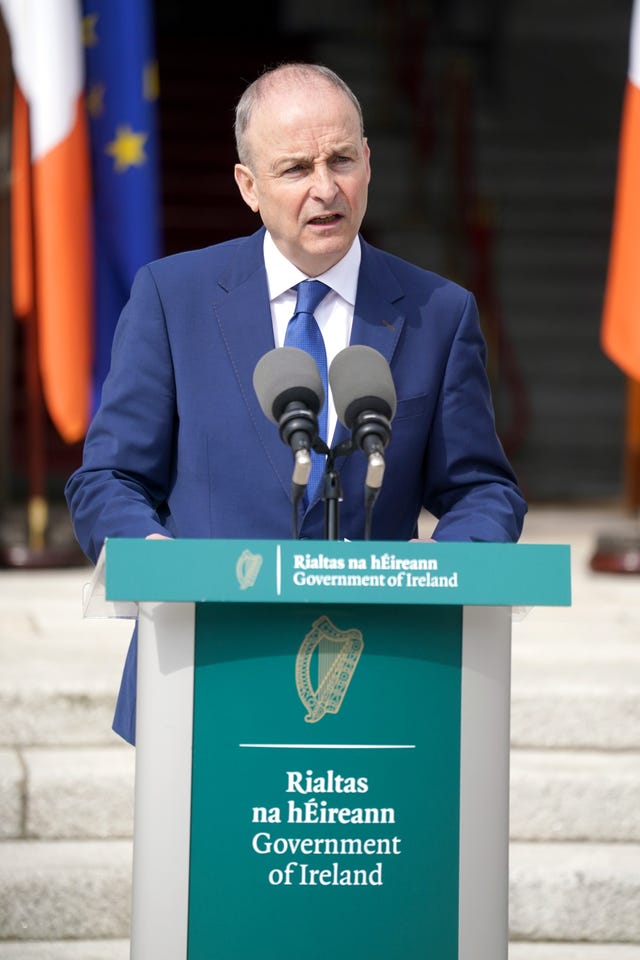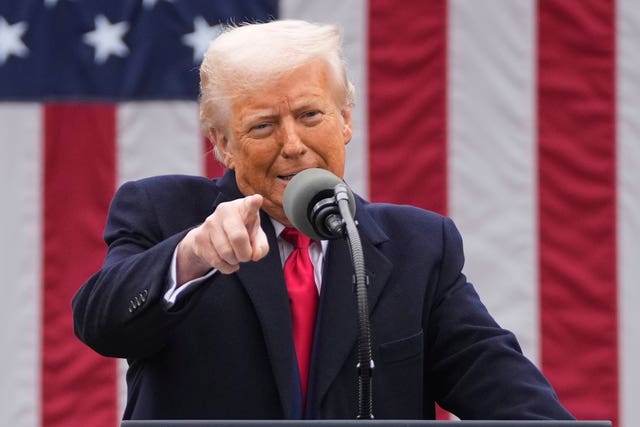US tariffs on world-wide scale could create recessionary trends, Taoiseach says
Micheal Martin said he is concerned about the impact on investments and jobs in Ireland, the EU and across the world.

The imposition of US tariffs on a world-wide scale and at a high level could create recessionary trends across the globe, the Irish premier has warned.
Micheal Martin said he is concerned about the impact on investments and jobs in Ireland, the EU and across the world, saying investors will keep their head “below the parapet” until the fallout over US tariffs settles down.
Mr Martin made the comments to reporters at Government Buildings in Dublin the morning after US President Donald Trump announced that he was imposing a sweeping 20% tariff on imports from the EU, which will significantly impact Ireland.
The Fianna Fail leader said he “deeply regrets” the decision by Mr Trump to impose the tariffs, saying there is “no justification” for them.

He disputed the figures cited by the US to justify the imposition of tariffs, saying they “do not reflect the reality of the situation as we see it”.
Mr Martin said that Ireland and the EU will “weather this storm” in the face of US tariffs, but said they will have an adverse impact.
He said the next step will be negotiations.
Asked whether he believes Ireland could survive a recession, Mr Martin said: “I think we have to see how that plays out over the next while.
“The real problem is, though, the imposition of tariffs on such a wide scale and at a high level across the world will have a dampening effect on investment, and that in itself, could create recessionary sort of trends across the world.
“I’m worried more about the global impact of this and the impact on investments, the pausing of investments, perhaps, and investors generally, keeping the head below the parapet until this settles down.
“That is a problem. Sentiment matters. Psychology matters. Business people and investors want certainty, stability, predictability.
“They don’t have that at the moment, and that’s my overarching concern.”
He added: “I deeply regret the United States decision to impose 20% tariffs on imports from across the European Union. We see no justification for this.
“More than 4.2 billion worth of goods and services are traded between the European Union and the US daily. Disrupting this deeply integrated relationship with tariffs and increased protectionism benefits no one.”
He also said that the EU and Ireland will “not be shy” in advocating for its interests when negotiating with the US.
“No country is going to be shy and Ireland will not be shy in saying, in terms of our interests, but also strategy,” he said.
“I think the strategy is the key issue here, in terms of designing counter-measures that would have the desired impact of bringing people to the table and enabling negotiations.

“The feedback so far from the US is, our sense is, that negotiations is the preferred route forward.
“The next 48 hours will tell a lot. What I get from the President’s speech is very much sort of wanting to engage, and signalling a desire to engage, to negotiate a sensible settlement here.”
Ireland’s European Commissioner Michael McGrath, who also attended the press conference in Dublin alongside Mr Martin, said that the EU is ready to negotiate with the United States.
“There has been engagement between Commissioner (for Trade Maros) Sefcovic, (US) Secretary (Howard) Lutnick and others over the last number of weeks,” he said.
“The current provisional estimate is that overall, around 380 billion euro of EU exports will be subject to the additional tariffs, that comprises of approximately 290 billion subject to the so-called reciprocal tariffs, 26 billion subject to tariffs on steel and aluminium, and 67 billion euro subject to US tariffs on cars and car parts.
“This would represent, overall, around 70% of all EU exports to the US being subject to new tariffs that have been announced yesterday and indeed in recent days, which would result in around 80 billion euro in additional duties on EU exports to the United States.
“This relationship between the US and the EU is mutually beneficial.
“We are each other’s most important trade and investment partner.”
He went on to say that the EU is preparing for further countermeasures to protect Irish and EU interests and businesses if negotiations with the US fails.
Meanwhile, Irish deputy premier said there is a need for “maturity” in negotiations between the European Union and the US.
Speaking to reporters in Dublin on Thursday, Mr Harris said he took a “grain of hope” in Mr Trump’s stated willingness to engage with other countries.
“It’s absolutely clear President Trump wanted this big moment last night. He got it: Big charts and all – that happened in the Rose Garden, that bit is done.
“What we now need is the maturity of actually sitting down in a room and finding a way forward that’s good for the US economy, good for the EU economy, and that then ultimately is good for Ireland.”
Mr Harris said he was seeking a “negotiated way forward” but said the EU “has to respond if the US refuses to engage”.
He said the bloc cannot “stand idly by” and added: “We don’t want to be involved in tit for tat. We’d much rather be involved in talks.”
On Wednesday, Mr Trump announced a minimum baseline tariff of 10% on all imports from all countries, with additional higher rates for some regions – including a 20% tax on goods from Ireland and the rest of the EU.
The 10% rate is effective from April 5 while the “individualised reciprocal higher” rates will be implemented from April 9.
Further information published by the White House suggests that Ireland’s crucial pharmaceutical industry is exempt from the measures for now.
However, the working assumption of the Government is that the US administration intends to bring further tariffs on that sector in the future as the White House seeks to increase domestic production.

Mr Trump has previously threatened tariffs on the sectors and may yet make further orders.
Mr Harris, who is also Irish Foreign Affairs and Trade Minister, said: “I think we have to take President Trump at his word here.”
There had been significant anxiety in Ireland in the run-up to Wednesday’s announcement, with the US administration’s protectionist approach to tariffs and tax posing a major risk to the Irish economy that is in large part sustained by long-standing investment by US multinationals.
The potential impact on the pharmaceutical sector, which employs around 45,000 people, was a particular cause of concern.
Total Irish exports were valued at 223.8 billion euros last year, with roughly one third going to the US.
Of the 72.6 billion euros in US imports from Ireland, approximately 58 billion euros relates to pharmaceuticals and chemicals leaving Ireland.
It had been projected this could halve if Mr Trump had implemented a 20% tariff on the goods and the EU had responded in kind.
The immediate suggestion that pharmaceuticals are not currently part of the new tariff measures comes despite both Mr Trump and his Commerce Secretary Howard Lutnick previously focusing on Ireland’s moves to attract that sector.
The US administration could still implement higher tariffs on pharmaceuticals at a later date, with the White House warning that future good-specific or sector-specific taxes may be announced.
The industry will also have to examine the specifics of the lengthy and technical list of exemptions.
Mr Harris said Ireland continues to engage with the US and points out that 80% of pharmaceutical exports to the US are not finished goods, and require further work in US factories – which comes with jobs and taxes there.
Mr Martin travelled to Washington DC last month, where the US president told him he did not want “to do anything to hurt Ireland” but added that the trade relationship between the countries should be focused on “fairness”.
He accused the Irish Government of “taking” US pharmaceutical companies through attractive taxation measures and said: “We’re going to take back our wealth and take back a lot of the companies that left.”
He added: “All of a sudden Ireland has our pharmaceutical companies, this beautiful island of five million people has got the entire US pharmaceutical industry in its grasp.”
Mr Lutnick, who has described Ireland as his favourite “tax scam”, told a podcast last month: “They have all of our (intellectual property) for all our great tech companies and great pharma companies.
“They all put it there because it’s low tax.
“They don’t pay us, they pay them, so that is going to end.”
During Wednesday’s announcement, Mr Trump said his administration was being “very kind” by implementing tariffs for most trading partners that were essentially half the rate of measures it had calculated was imposed on the US.
Ireland was not specifically mentioned in the address, but Mr Trump emphasised his response to the EU.
He said: “They rip us off, it is so sad to see, it is so pathetic.
“They charge us 39%, we’re going to charge 20%, so we’re charging them essentially half.”
The comments means that the US administration considers that a “full reciprocal” tariff rate for the EU would be 39%.
Mr Martin disputed this, saying that the figure cited by the United States to justify the imposition of tariffs “do not reflect the reality of the situation as we see it”.
“I think it was inevitable that some figures were going to be produced last evening to justify the position of tariffs,” he said.
He said that Irish companies should be encouraged to break into new markets, and negotiate new trade deals between Europe and other big economic actors, including India and Indonesia.





